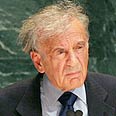
Eli Wiesel
Photo: Reuters
Nobel Peace Prize laureate Elie Wiesel says he's repudiating a Hungarian award he received in 2004 because top officials from Budapest recently attended a ceremony for a Nazi sympathizer.
The memorial rite weeks ago offended the 83-year-old Holocaust survivor, whose parents and sister were sent to their deaths by wartime Hungarian officials.
Shocking Chapter
Long-awaited bill passed by parliament sees Jewish community paid $51.93 million between 2013-2023 through special fund for communal property taken during Nazi, Soviet occupations of country
"It's too close to home," Wiesel told The Associated Press in an interview last week.
Wiesel said in a letter to Hungarian Parliamentary Speaker Laszlo Kover that he doesn't want to be associated with activities such as the May 27 ceremony for Jozsef Nyiro, a World War II member of Hungary's parliament whom Wiesel calls a "fascist ideologue" and "an anti-Semite."
"It is with profound dismay and indignation that I learned of your participation," along with Hungarian Secretary of State for Culture Geza Szocs and Gabor Vona, the leader of the far-right Jobbik party, Wiesel wrote.
"I hereby repudiate the Grand Cross Order of Merit" bestowed by Hungary's president, wrote Wiesel, an author awarded the Nobel in 1986 as a "messenger to mankind."
When asked to comment on the letter, a spokesman for the Hungarian parliament said that Kover would reply later this week. Szocs has resigned and could not be reached. And Vona did not immediately respond to a request for comment.
Last month's ceremony for Nyiro was originally planned as a reburial in his native Romania, which is where Wiesel also was born. The area was annexed by Hungary, which was then friendly to Hitler. Wiesel, his parents and three sisters were deported from their town of Sighet; only he and two sisters survived the Holocaust.
The ceremony in the city of Odorheiu Secuiesc, Romania, took place without Nyiro's ashes after Romanian officials objected.
Nyiro served as a lawmaker in the Hungarian parliament during its World War II alliance with Nazi Germany. He fled the advancing Soviets in 1945 and settled in Spain, where he died and was buried in 1953.
Nyiro was also a poet, and his works are still being read in Hungary and are included in the list of authors recommended for schools.
Wiesel, who lives in New York, told the AP that another reason he's rejecting the award is "because the late wartime dictator Miklos Horthy who sent 500,000 Jews to Auschwitz in 1944 is becoming a heroic figure again in his country."
Wiesel says he's not blaming the Hungarian people for what their leaders did, or are doing.
"I don't believe in collective guilt, but I do believe in taking a position about matters that happen today," he said. "To celebrate and honor leaders of fascist Hungary is wrong."
Wiesel wrote Kover that in recent months, "it has become increasingly clear that Hungarian authorities are encouraging the whitewashing of tragic and criminal episodes in Hungary's past, namely the wartime Hungarian government's involvement in the deportation and murder of hundreds of thousands of its Jewish citizens."















